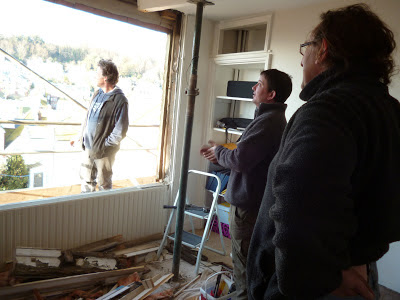The Roman god Janus, looking back to the past and forward to the future
I write this in the midst of a howling southwesterly gale, which seems to have been going on for about a week. I thought this sort of thing only happened at Land's End or the Shetland Islands, but evidently not. The northwest corner of the Matchbox is timber-framed on both walls, as a result of which, when the wind screams off the sea, there is distinct movement in the top bedroom, where we have been sleeping - not to mention a roar down the chimney. We keep reminding ourselves that the building has stood for more than two centuries, but it takes a bit of getting used to.
It's been a year of immense transition: moving country, settling in a town we didn't know, refurbishing the Shoebox and Matchbox, getting to know new people. It's seven months since we left France, and only now do I feel we're beginning to settle. We hope to move back into the Shoebox at the beginning of February, and by that stage we should be approaching normality.
In the wider world, I find it impossible not to feel concerned about what is happening. We have lost faith in our churches, our policemen and the media. The guardians of civilised standards appear to be falling away, one by one. I have little faith, either, in our squabbling and posturing politicians. More fundamentally, I sense that the growth model of capitalism - on which global "economic recovery" is based - is now obsolete. What I am hoping for in the New Year is for a wind as strong as our current gale to blow out the cobwebs of old concepts and bring back originality, flair and some lateral thinking. And then for some calm and some sunshine.
A very happy New Year to you all.
Antony Mair





































